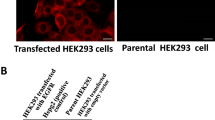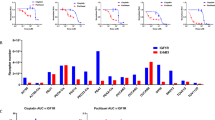Abstract
Ovarian cancer is the most deadly gynecological malignant tumor in the world today. Previous studies have shown that insulin-like growth factor-1 receptor (IGF-1R) is closely related to the occurrence and development of ovarian cancer, and ovarian cancer cells endogenously express high IGF-1R. Therefore, IGF-1R could be used as a target for ovarian cancer treatment. In the past, the strategy for preparing IGF-1R antagonists was to use IGF-1R antibody and small-molecule inhibitor. In the current research, we use a new method to prepare IGF-1R antagonists. We prepared a series of IGF-1 internal imaging anti-idiotypic antibodies by anti-idiotypic antibody strategy. After a series of screening and identification, one of the anti-idiotypic antibodies (B003-2A) was selected for further evaluation, and the results showed that B003-2A could not only inhibit the binding of IGF-1 to IGF-1R but also inhibit the signaling mediated by IGF-1R. Further work showed that B003-2A inhibited the proliferation of ovarian cancer cells in vivo and in vitro. In addition, the current study also indicates that B003-2A could enhance the sensitivity of cisplatin in cisplatin-resistant ovarian cancer cell lines. In summary, our research shows that B003-2A can be used to treat ovarian cancer. The current study also laid the foundation for the development of IGF-1R antagonist.














Similar content being viewed by others
Abbreviations
- IGF-1R:
-
Insulin-like growth factor 1R
- IGF-1:
-
Insulin-like growth factor 1
References
Lei L, Xiaoning B, Hengzi S, Simiao L, Ying Z, et al. Characterization of ovarian cancer cells and tissues by Fourier transform infrared spectroscopy. J Ovarian Res. 2018;11(1):64.
Tomasch G, Lemmerer M, Oswald S, Uranitsch S, Schauer C, Schütz A-M, et al. Prophylactic salpingectomy for prevention of ovarian cancer at the time of elective laparoscopic cholecystectomy. Br J Surg. 2020;107:519–24.
Testa U, Petrucci E, Pasquini L, Castelli G, Pelosi E. Ovarian cancers: genetic abnormalities, tumor heterogeneity and progression, clonal evolution and cancer stem cells. Medicines. 2018;5(1):16.
Yang X, Fraser M, Moll UM, Basak A, Tsang BK. Akt-mediated cisplatin resistance in ovarian cancer: modulation of p53 action on caspase-dependent mitochondrial death pathway. Cancer Res. 2006;66(6):3126–36.
Fu LJ, Wang B. Retraction note: investigation of the hub genes and related mechanism in ovarian cancer via bioinformatics analysis. J Ovarian Res. 2013;6(1):92.
Berton-Rigaud D, Floquet A, Mollon-Grange D, Dechartres A, Selle F. Use of bevacizumab (bev) in real life for first-line (fl) treatment of ovarian cancer (OC)/the GINECO ENCOURAGE cohort of 500 French patients. Ann Oncol. 2019;30:v418.
Wang W, Zhang Y, Lv M, Feng J, Peng H, Geng J, et al. Anti-IGF-1R monoclonal antibody inhibits the carcinogenicity activity of acquired trastuzumab-resistant SKOV3. J Ovarian Res. 2014;7(1):103.
Dobbin Z, Landen C. The importance of the PI3K/AKT/MTOR pathway in the progression of ovarian cancer. Int J Mol Sci. 2013;14(4):8213–27.
Shang Y, Mao Y, Batson J, Scales SJ, Phillips G, Lackner MR, et al. Antixenograft tumor activity of a humanized anti-insulin-like growth factor-I receptor monoclonal antibody is associated with decreased akt activation and glucose uptake. Mol Cancer Ther. 2008;7(9):2599–608.
Wang Y. Inhibition of insulin-like growth factor-I receptor (IGF-IR) signaling and tumor cell growth by a fully human neutralizing anti–IGF-IR antibody. Mol Cancer Ther. 2005;4(8):1214–21.
Mulvihill MJ, Cooke A, Rosenfeld-Franklin M, Buck E, Ji QS. Discovery of OSI-906: a selective and orally efficacious dual inhibitor of the IGF-1 receptor and insulin receptor. Future Med Chem. 2009;1(6):1153–71.
Jia MQ, Chen ZY, Wu X, Liu JB, Wu YF. Relationshiop between IGF1, IGF1R and akt and cisplatin resistance of ovarian cancer. Chin J Cancer Prev Treat. 2012;19(22):1734–7.
Yong Z, Sanxiu H, Yu G, Lingfeng L. MiR-1294 confers cisplatin resistance in ovarian cancer cells by targeting IGF1R. Biomed Pharmacother. 2018;106:1357–63.
Davaadelger B (2016) The role of p53, ploidy and IGF-1R/AKT/mTORC1 pathway in cisplatin resistance. Doctoral dissertation
Sun Y, Zheng S, Torossian A, Speirs CK, Schleicher S, Giacalone NJ, Carbone DP, Zhao Z, Lu B. Role of insulin-like growth factor-1 signaling pathway in cisplatin-resistant lung cancer cells. Int J Radiat Oncol Biol Phys. 2012;82:e563–72.
Acknowledgements
Young and middle-aged health technology innovation leading talent training program of Henan province (YXKC2020012).
Author information
Authors and Affiliations
Contributions
ZW, XY, and WW performed the experiments; JJ and BJ drafted the manuscript. ZW and ZR edited the manuscript. WC and GR conceived of the study and participated in its design and coordination.
Corresponding author
Ethics declarations
Conflict of interest
The authors declare that they have no conflict of interest.
Ethical approval
All animal care and experimental procedures were approved by the first affiliated hospital of Zhengzhou University (2021-KY-0018-001).
Additional information
Publisher's Note
Springer Nature remains neutral with regard to jurisdictional claims in published maps and institutional affiliations.
Supplementary Information
Below is the link to the electronic supplementary material.
Rights and permissions
About this article
Cite this article
Weiwei, Z., Ya, X., Wenwen, W. et al. IGF-1R anti-idiotypic antibody antagonist exhibited anti-ovarian cancer bioactivity and reduced cisplatin resistance. Human Cell 34, 1197–1214 (2021). https://doi.org/10.1007/s13577-021-00535-x
Received:
Accepted:
Published:
Issue Date:
DOI: https://doi.org/10.1007/s13577-021-00535-x




